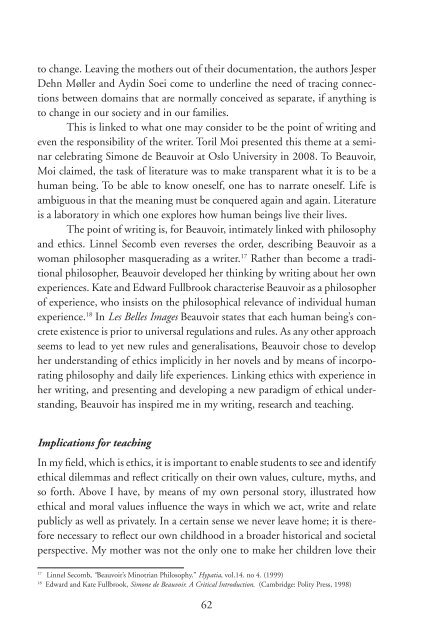Teaching Subjectivity. Travelling Selves for Feminist ... - MailChimp
Teaching Subjectivity. Travelling Selves for Feminist ... - MailChimp
Teaching Subjectivity. Travelling Selves for Feminist ... - MailChimp
Create successful ePaper yourself
Turn your PDF publications into a flip-book with our unique Google optimized e-Paper software.
to change. Leaving the mothers out of their documentation, the authors Jesper<br />
Dehn Møller and Aydin Soei come to underline the need of tracing connections<br />
between domains that are normally conceived as separate, if anything is<br />
to change in our society and in our families.<br />
This is linked to what one may consider to be the point of writing and<br />
even the responsibility of the writer. Toril Moi presented this theme at a seminar<br />
celebrating Simone de Beauvoir at Oslo University in 2008. To Beauvoir,<br />
Moi claimed, the task of literature was to make transparent what it is to be a<br />
human being. To be able to know oneself, one has to narrate oneself. Life is<br />
ambiguous in that the meaning must be conquered again and again. Literature<br />
is a laboratory in which one explores how human beings live their lives.<br />
The point of writing is, <strong>for</strong> Beauvoir, intimately linked with philosophy<br />
and ethics. Linnel Secomb even reverses the order, describing Beauvoir as a<br />
woman philosopher masquerading as a writer. 17 Rather than become a traditional<br />
philosopher, Beauvoir developed her thinking by writing about her own<br />
experiences. Kate and Edward Fullbrook characterise Beauvoir as a philosopher<br />
of experience, who insists on the philosophical relevance of individual human<br />
experience. 18 In Les Belles Images Beauvoir states that each human being’s concrete<br />
existence is prior to universal regulations and rules. As any other approach<br />
seems to lead to yet new rules and generalisations, Beauvoir chose to develop<br />
her understanding of ethics implicitly in her novels and by means of incorporating<br />
philosophy and daily life experiences. Linking ethics with experience in<br />
her writing, and presenting and developing a new paradigm of ethical understanding,<br />
Beauvoir has inspired me in my writing, research and teaching.<br />
Implications <strong>for</strong> teaching<br />
In my field, which is ethics, it is important to enable students to see and identify<br />
ethical dilemmas and reflect critically on their own values, culture, myths, and<br />
so <strong>for</strong>th. Above I have, by means of my own personal story, illustrated how<br />
ethical and moral values influence the ways in which we act, write and relate<br />
publicly as well as privately. In a certain sense we never leave home; it is there<strong>for</strong>e<br />
necessary to reflect our own childhood in a broader historical and societal<br />
perspective. My mother was not the only one to make her children love their<br />
17<br />
Linnel Secomb, “Beauvoir’s Minotrian Philosophy.” Hypatia, vol.14. no 4. (1999)<br />
18<br />
Edward and Kate Fullbrook, Simone de Beauvoir. A Critical Introduction. (Cambridge: Polity Press, 1998)<br />
62

















